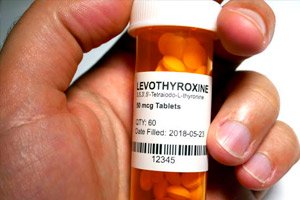
All iLive content is medically reviewed or fact checked to ensure as much factual accuracy as possible.
We have strict sourcing guidelines and only link to reputable media sites, academic research institutions and, whenever possible, medically peer reviewed studies. Note that the numbers in parentheses ([1], [2], etc.) are clickable links to these studies.
If you feel that any of our content is inaccurate, out-of-date, or otherwise questionable, please select it and press Ctrl + Enter.
Thyroid medication levothyroxine is associated with loss of bone mass
Last reviewed: 03.07.2025
 ">
">Clinical studies have shown that the use of levothyroxine, a drug used to treat hypothyroidism, may lead to decreased bone mass and density in older adults with normal thyroid hormone levels. The findings were presented at the 2024 annual meeting of the Radiological Society of North America, although the results have not yet been peer-reviewed.
Key findings of the study:
- Bone loss:
In older adults over 65 years of age taking levothyroxine, a decrease in total bone mass and bone density was observed over 6 years of follow-up. - Risk of osteoporosis:
Even at the correct dosage, the drug may promote bone resorption, which increases the risk of osteoporosis.
Why do you need levothyroxine?
Levothyroxine is widely used to treat hypothyroidism, a condition in which the thyroid gland does not produce enough hormones. These hormones play a key role in metabolism, temperature regulation, heart function, and the digestive system.
Signs of hypothyroidism include:
- Fatigue
- Weight gain
- Cold intolerance
- Dry skin and hair loss
- Problems with concentration
The drug helps to eliminate these symptoms and normalize hormonal balance, but its side effects require careful monitoring.
Levothyroxine and osteoporosis
Researchers at Johns Hopkins University have previously linked levothyroxine use to muscle loss in older adults. The new study confirms that in patients with normal hormone levels, taking the drug may worsen bone health.
Research methodology:
- Participants: 81 people (32 men and 49 women) aged 65 years and older (average age 73 years).
- Measurements: Dual X-ray absorptiometry to assess bone mass and density.
- Control group: Participants with comparable parameters (age, body mass index, gender, TSH level, etc.).
Problems with taking levothyroxine
Overdiagnosis of hypothyroidism:
Research shows that thyroid stimulating hormone (TSH) levels can vary seasonally, which can lead to misdiagnosis.Subclinical hypothyroidism:
Many patients with moderately elevated TSH and slightly decreased T4 levels are diagnosed with subclinical hypothyroidism, which leads to the prescription of levothyroxine.Unwanted side effects:
Side effects include increased heart rate, anxiety, and bone loss.
Options for patients
Oncologist Sue Clanton notes that deprescribing (stopping the drug) may be considered if side effects occur, especially if thyroid function tests return to normal.
Conclusion
The study highlights the need to:
- Individual approach to treatment: The administration of levothyroxine requires careful monitoring, especially in elderly patients.
- Review of prescribing criteria: It is important to take into account seasonal fluctuations in TSH levels and avoid unnecessary prescribing of the drug.
Levothyroxine remains an important drug but requires more precise use to minimize risks and improve patients' quality of life.
